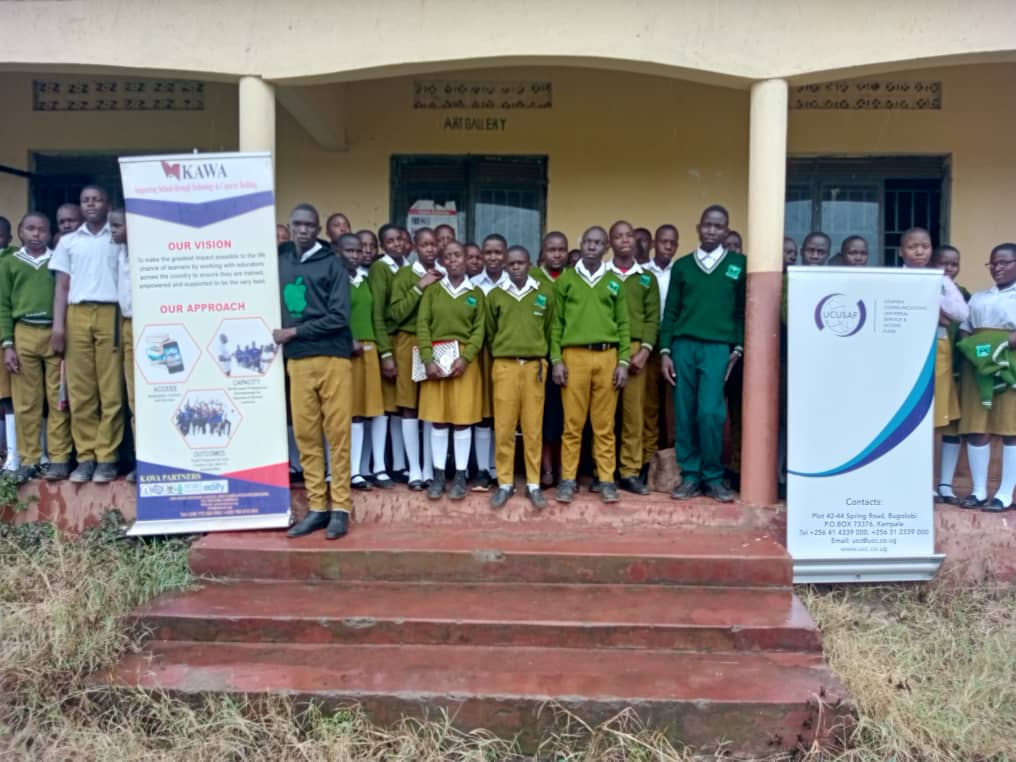Kiganda High School Champions Digital Literacy with Powerful ICT Club Launch

The digital future is taking shape at Kiganda High School, where on February 15th, 2025, an inspiring ICT Club launch and training session was conducted. With the coordination of KAWA Uganda and support from the Uganda Communications Commission (UCC), this initiative ignited a wave of enthusiasm among students and staff for technology integration and digital learning. The session was facilitated by Edith Kugonza, a passionate digital literacy advocate from KAWA.
The school, located in Kigganda Zone along the Mityana–Mubende Road in Kassanda District, hosted a full-day training that covered practical digital skills, ethical technology use, and project-based innovation. The sessions were dynamic and inclusive, utilizing 42 fully networked computers for hands-on training.
Among the key voices championing the club’s impact was Mr. Hezekiah Mukasa, an enthusiastic school ICT lead. He noted,
“This launch has given our students a real chance to catch up with the rest of the world. The skills they are gaining are no longer optional—they are essential.”
Haji Bashir Lubega Sempa, the headteacher of Kiganda High School, added a heartfelt reflection,
“Our mission is to raise not just students, but responsible digital citizens. With this ICT Club, we are empowering our learners to not only consume content but also create and lead using technology.”
The training was rich with practical engagement, beginning with an introduction to the ICT Club’s purpose and long-term goals. Students explored how the club would not only enhance digital literacy but also cultivate responsibility for managing and sustaining the school’s ICT lab.
The ICT Lab Management and Sustainability session emphasized computer care and lab maintenance. Next came Basic Computer Maintenance and Troubleshooting, where students were introduced to diagnosing and resolving simple tech issues independently—a first for many.
As online risks increase, a module on Internet Safety and Cybersecurity Awareness captured students’ attention. They learned about safeguarding their digital identities and how to responsibly interact in online spaces. This was followed by an eye-opening session on Digital Skills Beyond the Curriculum, which introduced learners to real-world applications of coding, internet tools, and content creation.
Students also participated in conversations about UCC and UCUSAF ICT initiatives, learning how to take part in shaping school-based technology projects and accessing national competitions. These segments concluded with a challenge to the learners: to start developing innovative tech solutions for their communities.
However, the session was not without challenges. One key concern identified was low ICT competency among some teachers, which could affect the consistency of digital programs. In response, both patrons and facilitators stressed the need for targeted teacher capacity-building workshops.
“To sustain this momentum, we must invest in our teachers too,” urged Patron Mr. Mukasa, calling for structured professional development and ongoing support.
Furthermore, although the training primarily engaged Senior Two students, the facilitators strongly recommended broadening participation across all classes to build a more inclusive digital culture at the school.
Key Highlights:
- 42 networked computers were used for effective hands-on training.
- All participating teachers had smartphones, promoting digital lesson integration.
- Training covered digital skills, cybersecurity, maintenance, and innovation.
- Patrons and students expressed strong enthusiasm for future ICT competitions.
With the energy sparked during this launch, Kiganda High School is now positioned as a regional leader in student-driven digital transformation. The school community, under the leadership of its visionary educators and supported by national ICT agencies, is committed to building a future-ready generation.








